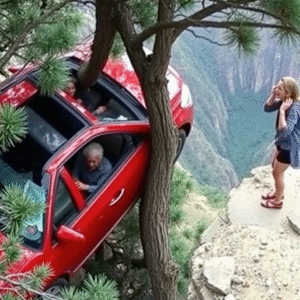A Gray Afternoon of Farewell
It was one of those gray spring afternoons when grief seemed to hang in the air like mist. The churchyard was silent except for the soft whisper of rain against black umbrellas. Friends, neighbors, and family had gathered to say goodbye to Thomas Hale — a man remembered not for wealth or fame, but for his gentle strength and unwavering kindness.
At sixty, Thomas had lived a quiet life on his small farm. He raised horses, mended fences, and shared his harvest with anyone in need. But among all his companions, one stood apart — Storm, a striking white stallion Thomas had rescued as a frightened foal and raised into a loyal friend.
The Bond That Couldn’t Be Broken
Everyone in the village knew them as inseparable. You never saw one without the other. Whether plowing fields, visiting the market, or walking the hills at sunset, they moved together like two halves of the same soul.
When Thomas died suddenly of a heart attack, the entire village mourned. Yet the one who grieved most could not speak — and had four legs.
The Morning of the Funeral
In the days after Thomas’s passing, Storm refused to eat or rest. He pawed at the stall, searching for the voice he would never hear again. On the morning of the funeral, the stable door stood open. Storm was gone — vanished into the fog that curled around the woods.
The family searched the meadows and trails, calling his name. But Storm had disappeared. They assumed he had wandered off in confusion — or perhaps followed an instinct animals feel when death comes near.
By noon, mourners filled the small countryside church. Rain trickled down the stained-glass windows like tears. The priest spoke of Thomas’s faith and kindness, his simple life that left a deep mark.
Six pallbearers lifted the plain oak coffin, covered in white lilies, and carried it toward the hearse. The only sounds were the crunch of gravel and the murmured prayers.
Then, a cry echoed through the valley — wild, haunting, and unlike anything they had ever heard.
The Arrival No One Expected
Heads turned. From beyond the trees came the rhythm of hooves striking mud. Out of the mist appeared a white shape — faintly glowing in the dull light.
It was Storm.
Gasps rippled through the crowd as he approached, his mane tangled, his coat streaked with mud, his body trembling with exhaustion. Yet his dark eyes locked on one thing — the coffin.
The pallbearers stopped. The priest lowered his book. Time seemed to hold its breath.
Storm took slow, steady steps forward, splashing through puddles until he stood beside the coffin. Then, with quiet grace, he lowered his head and rested his muzzle against the wood.
No one spoke. No one moved. The rain softened to a whisper. For a long, fragile moment, it was just the white horse and the man who had loved him — united one last time.
The Gesture That Broke Every Heart
Storm stood still, muzzle pressed to the coffin. Then came a low sound — half cry, half sigh — the sound of an animal mourning what it cannot understand.
He nudged the coffin softly, the same gentle nudge he once gave when Thomas brought him apples.
That’s when the crowd began to cry.
Hardened farmers wiped their eyes. Children hid their faces in their mothers’ coats. Even the priest turned away, overcome.
“He came back to say goodbye,” someone whispered.
Storm lifted his head, eyes glistening, and released a long, echoing whinny that rolled across the valley like a hymn — a farewell that seemed to reach heaven itself.
Only when the hearse door closed did he step back.
A Promise Kept Beyond the Grave
After the service, as the mourners drifted away, Storm refused to move. He stood beneath the rain, watching the hearse until it disappeared down the road.
When the last car left, Daniel, Thomas’s eldest son, approached quietly.
“Come on, boy,” he whispered, stroking the horse’s wet mane. “He’s gone now.”
Storm pressed his muzzle against Daniel’s chest as if he understood. Then, step by step, he followed him home.
That night, Storm stood outside his stable — the same one he had escaped — but refused to enter. He gazed toward the fields he and Thomas had once roamed, his white coat glowing in the moonlight. As dawn broke, he sighed softly and lay down, the farm silent except for a distant owl.
The Ritual That Moved a Village
In the weeks that followed, Storm began a quiet ritual. Every morning, at the hour Thomas used to feed him, he walked to the edge of the paddock and faced the hill where his master rested.
He stood there motionless — rain or shine — before returning to his stall. It was as if he still expected to see Thomas cresting the hill with his familiar whistle.
Word spread quickly. Visitors came to watch, leaving apples by the fence or standing in silence. The horse’s devotion became a story shared in church pews, whispered in kitchens, and told at the market.
The village priest later wrote in his journal:
“In all my years, I have seen faith and grief, but never love as pure as the bond between Thomas Hale and his horse. Perhaps animals understand eternity better than we do.”
The Final Goodbye
A year later, on a calm summer morning, Storm was found lying peacefully beneath the oak tree that shaded Thomas’s grave. His eyes were closed, his body still, his expression serene.
Daniel buried him there, at the foot of the hill, under the same sky that had watched over them both. The family placed a simple stone etched with the words:
“Together again — man and horse, heart to heart.”
Now, when the wind sweeps across those fields, villagers say they can still hear them — the rhythm of hooves, the soft murmur of a man’s voice, the bond that refused to end.
What Storm Taught Us About Love
Storm’s devotion reminds us that some goodbyes never truly end. Love doesn’t fade — it transforms.
The white horse that appeared from the mist didn’t just mourn his master; he showed an entire village what unconditional love looks like. He proved that loyalty has no language and that sometimes, the purest hearts walk on four legs.
Thomas Hale was known for kindness in life. In death, that kindness lived on — carried by a horse whose love touched heaven itself.
Each spring, when the rain returns and the earth smells of renewal, the villagers still look toward the hill and remember.
Because love — real love — never truly says goodbye.





